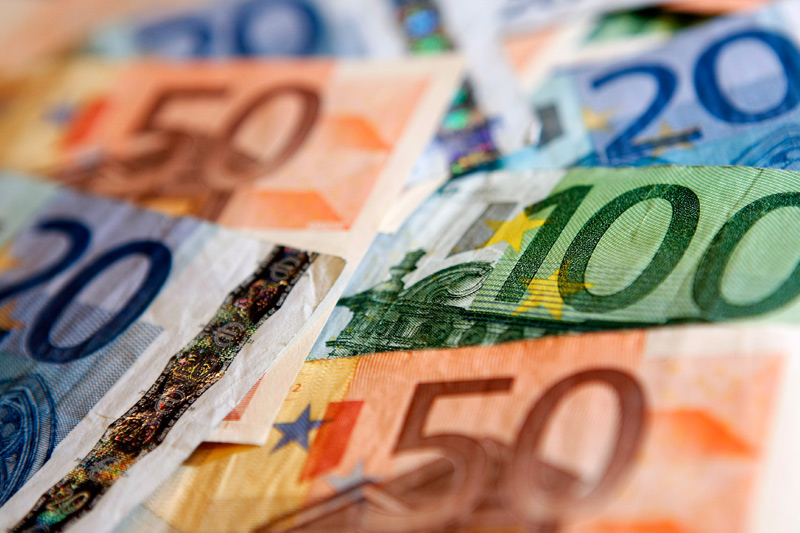Investing.com’s stocks of the week
Investing.com - The euro gained ground against the U.S. dollar and the yen on Monday, as concerns over a Greek exit from the euro zone subsided after weekend opinion polls showed increasing support for a pro-bailout party ahead of elections in June.
During European late morning trade, the euro pushed higher against the U.S. dollar, with EUR/USD climbing 0.53% to hit 1.2582.
The euro found support after an opinion poll indicated that Greek conservative party New Democracy may be able to form a government following the June 17 elections, after inconclusive election earlier this month sparked fears that the country could be forced out of the euro area.
But investor sentiment remained fragile amid uncertainty over the outcome of the June elections, while fears over the health of Spain’s banking sector and the country’s rising borrowing costs also weighed.
Spain’s government announced Sunday that it was to recapitalize one of the country’s largest commercial lenders, fuelling fresh fears that the rising cost of bank rescues could force Madrid into seeking an international bailout.
Spain’s Treasury auctioned the full targeted amount of EUR3.5 billion of two-year bonds earlier, but the yield climbed to 4.03%, up sharply from 3.35% at a similar auction in April.
Meanwhile, the yield on Spanish 10-year government bonds climbed to 6.50% on Monday, up from 6.34% on Friday.
Elsewhere, the single currency was marginally higher against the yen, with EUR/JPY gaining 0.10% to hit 99.83.
Earlier Monday, the minutes of the Bank of Japan’s April 27 meeting said that policymakers agreed to ease monetary policy in order to ensure the continued economic recovery, but said that the central bank needs to counter the “misunderstanding” in markets that easing will automatically continue until the bank’s 1% inflation target is met.
The single currency edged higher against the pound and the Swiss franc, with EUR/GBP gaining 0.29% to hit 0.8012 and EUR/CHF inching up 0.10% to hit 1.2022.
Over the weekend, Swiss National Bank Chairman Thomas Jordan said the central bank was looking at drawing up contingency measures to deal with a possible collapse of the euro zone, but added that the SNB believes such a scenario is highly unlikely.
In contrast, the euro was weaker against the Canadian, Australian and New Zealand dollars, with EUR/CAD slipping 0.13% to hit 1.2868, EUR/AUD falling 0.68% to hit 1.2739 and EUR/NZD tumbling 0.76% to hit 1.6473.
In Australia, central bank Governor Glenn Stevens said earlier that in addition to the debt crisis in the euro zone, China’s slowing growth poses a threat to the Australian economy and must be closely monitored.
Trade looked set to remain quiet on Monday, with some markets in Europe closed for holidays, while markets in the U.S. were to remain closed for the Memorial Day holiday.
During European late morning trade, the euro pushed higher against the U.S. dollar, with EUR/USD climbing 0.53% to hit 1.2582.
The euro found support after an opinion poll indicated that Greek conservative party New Democracy may be able to form a government following the June 17 elections, after inconclusive election earlier this month sparked fears that the country could be forced out of the euro area.
But investor sentiment remained fragile amid uncertainty over the outcome of the June elections, while fears over the health of Spain’s banking sector and the country’s rising borrowing costs also weighed.
Spain’s government announced Sunday that it was to recapitalize one of the country’s largest commercial lenders, fuelling fresh fears that the rising cost of bank rescues could force Madrid into seeking an international bailout.
Spain’s Treasury auctioned the full targeted amount of EUR3.5 billion of two-year bonds earlier, but the yield climbed to 4.03%, up sharply from 3.35% at a similar auction in April.
Meanwhile, the yield on Spanish 10-year government bonds climbed to 6.50% on Monday, up from 6.34% on Friday.
Elsewhere, the single currency was marginally higher against the yen, with EUR/JPY gaining 0.10% to hit 99.83.
Earlier Monday, the minutes of the Bank of Japan’s April 27 meeting said that policymakers agreed to ease monetary policy in order to ensure the continued economic recovery, but said that the central bank needs to counter the “misunderstanding” in markets that easing will automatically continue until the bank’s 1% inflation target is met.
The single currency edged higher against the pound and the Swiss franc, with EUR/GBP gaining 0.29% to hit 0.8012 and EUR/CHF inching up 0.10% to hit 1.2022.
Over the weekend, Swiss National Bank Chairman Thomas Jordan said the central bank was looking at drawing up contingency measures to deal with a possible collapse of the euro zone, but added that the SNB believes such a scenario is highly unlikely.
In contrast, the euro was weaker against the Canadian, Australian and New Zealand dollars, with EUR/CAD slipping 0.13% to hit 1.2868, EUR/AUD falling 0.68% to hit 1.2739 and EUR/NZD tumbling 0.76% to hit 1.6473.
In Australia, central bank Governor Glenn Stevens said earlier that in addition to the debt crisis in the euro zone, China’s slowing growth poses a threat to the Australian economy and must be closely monitored.
Trade looked set to remain quiet on Monday, with some markets in Europe closed for holidays, while markets in the U.S. were to remain closed for the Memorial Day holiday.
